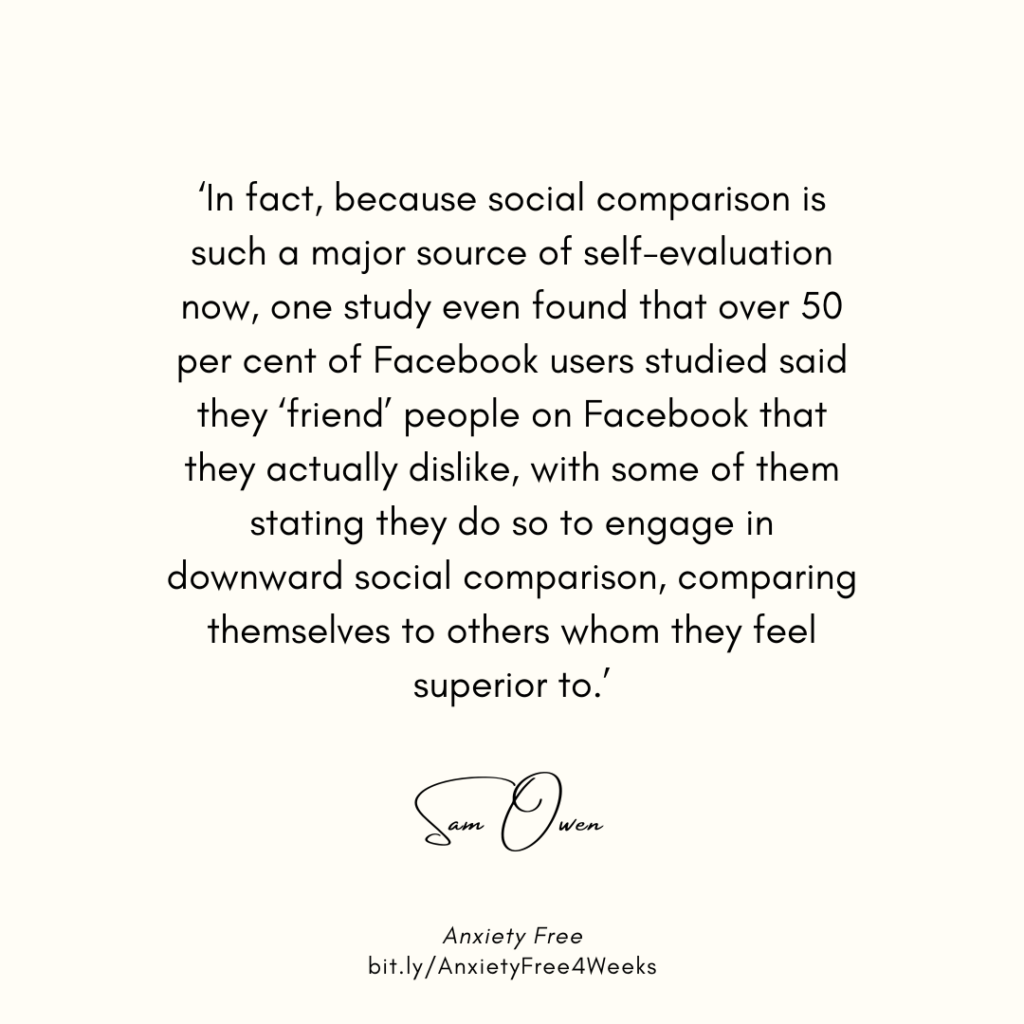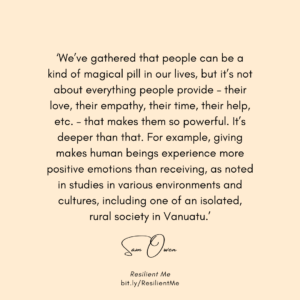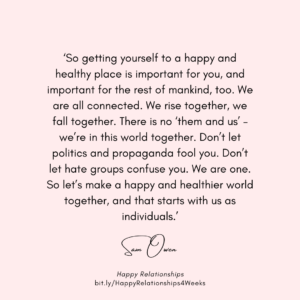
Happiness Is…
We live in a world where people have gone beyond trying to keep up with their neighbours, ‘the Jonses’, and are instead trying to keep up with the entire world. Wow! It’s a lot…of unhealthy pressure and social comparison.
We all know that comparing ourselves to others is silly because everyone’s circumstances, upbringing, genetics, advantages, disadvantages, life experiences, etc, are incomparable. Yet social comparison is one way that some people seek to gauge their worth, their achievements, and even the quality of their life.
But what does that do to one’s own happiness? And can it ever be sustainable? Plus, what sort of life does that create, one where you are so heavily focused on what you can accumulate? And what does it do to you if you are always trying to outshine others? If your focus is ultimately one of ‘me, me, me’, does it make you happy?
Happy, Not Happy
A researcher set out to look at how two different approaches to life – self-centredness and selflessness – impacted people’s overall happiness [1] by using experiments to test his and his colleague’s earlier documented theory, the Self-centredness/Selflessness Happiness Model [2].
The research highlights three important findings:
- Self-centredness and selflessness are two distinct separate psychological constructs, rather than running on a single continuum with self-centredness at one end and selflessness at the other. Self-centredness was assessed through egocentrism and materialism whilst selflessness was assessed through self-transcendence and connectedness to others. We’ll look at these differences shortly.
- Importantly, self-centredness was significantly related to fluctuating happiness, whilst selflessness was significantly, positively related to authentic–durable happiness.
- Just as they are two distinct psychological constructs, the outcomes of self-centredness and selflessness are determined by two distinct psychological processes. For those who approach life in a self-centred way, resulting painful emotional states such as anger, fear, jealousy, frustration, bring about fluctuating happiness, whilst the act of approaching life in a selfless manner results in emotional stability and the feeling of being in harmony which brings about sustainable authentic happiness.
So let’s look at how this happens.
The Self-centredness Approach
 When people approach life through self-centred means such as egocentrism and materialism, they are seeking to create pleasure and/or avoid pain. But seeking pleasure through things like clothes or cars, or selfies and other self-indulgent social media posts, only provides a short-term fix.
When people approach life through self-centred means such as egocentrism and materialism, they are seeking to create pleasure and/or avoid pain. But seeking pleasure through things like clothes or cars, or selfies and other self-indulgent social media posts, only provides a short-term fix.
The positive emotion, the high, or euphoria, soon wears off and the person is back to their original state. Or worse. They may now feel a little lower because the fixes are becoming increasingly short-lived and they are requiring a bigger fix each time. And maybe they can’t even obtain that bigger fix. They may not have the means to.
It’s like a drug addiction. Eventually you need more, and more frequently. And even then it may no longer positively impact you in the way it once did, as your brain and body become used to the fix.
When you look at the principle of greed for money, where no amount of money is ever enough, that is another example of unsustainable happiness because the high is short-lived, before the person needs another fix.
When a person can have absolutely anything because they have the money to afford it, the removal of striving for a goal makes the achievement of the goal (purchase) much less elevating. Again, the buzz is short-lived, and thus their happiness is unstable as the positive emotions they experienced temporarily, give way to the negative emotions that ensue, either because the buzz has worn off or because the negative emotions they are trying to suppress come back to the surface, such as sadness.
When people engage in materialism to suppress negative emotions, those emotions they are suppressing are still under the surface, the brain is still aware of them, as can be seen in brain scan studies, and they will keep coming back until the source of the emotional pain has been resolved.
So approaching the world from a place of egocentricity and materialism is a short-lived success strategy for happiness.
The Selflessness Approach
 In contrast to the Self-centredness Approach, one of focusing on oneself and seeking to fulfil one’s own needs, the Selflessness Approach to life means that a person sees themselves as connected with others and the world at large, being in harmony with themselves, their environment and all living things whilst also pursuing their deep personal aspirations.
In contrast to the Self-centredness Approach, one of focusing on oneself and seeking to fulfil one’s own needs, the Selflessness Approach to life means that a person sees themselves as connected with others and the world at large, being in harmony with themselves, their environment and all living things whilst also pursuing their deep personal aspirations.
This system of selflessness is seen as influencing all psychological activities: desire, motivation, attention, cognition, emotion, and behaviour.
And the benefits to the selfless person are numerous, from giving rise to positive emotions to resulting in better wellbeing to experiencing less psychological distress to enabling better relationships with others.
Being connected to more than just yourself, and seeing yourself as a connected part of the world is elevating.
Not just any old part either; if you see yourself as a crucial cog, you take your presence in the world more seriously, give to others and the world more joyously, and help yourself and others more fervently. All of this feeds positive emotions back into your own being. Thus, being selfless becomes food for the soul one might say.
And everyone is an important cog in the world; the help you give to one person cannot only turn their life around, it can also spread through their network and changes the lives of many.
And even when you only help one person, even with something small, like picking up something for them that they’ve dropped, it can feel amazing and it might be just the act of kindness they desperately needed. The tiniest bit of kindness can change lives for the better. That’s real joy for the giver. That’s true living.
Plus, you know how you hear about how people ‘throw themselves into their work’ when they are facing a bleak time in their life, in order to get through it. Of course, sometimes that can be a form of distraction, other times a form of suppression, the latter is not good for you and your healing. But if you throw yourself into helping others in some way, whether through your job/business should it be of that nature, or through volunteer work (official or unofficial), then you’ll find it can help you to not only forget your woes for a while, but actually feel positive emotions for part of your day, even when your life is plagued by negative emotions and utter darkness otherwise. You can help your way through your misery. And that’s pretty awesome. You help others and yourself whilst trying to ride the turbulent waves of life.
Selflessness Is Happiness
 So in being selfless, you actually help the self anyway, all the while helping other people, animals, nature, your local community, and mankind. You create a real, durable happiness rather than a fluctuating and fleeting happiness.
So in being selfless, you actually help the self anyway, all the while helping other people, animals, nature, your local community, and mankind. You create a real, durable happiness rather than a fluctuating and fleeting happiness.
The world needs more of that. You need more of that. That’s always a good way to go.
Notice also how all this social comparison is ruining society. Sure it’s nice to buy nice things sometimes or have nice experiences sometimes, but because you liked it, or you wanted to reward yourself, or you were low and just wanted a temporary fix alongside more sustainable happiness-inducing actives. That’s fine. But don’t make your life about that, don’t make it about being better than others, or fooling yourself into thinking it will fix what’s making you unhappy.
Make your life about being part of mankind in a positive way, leaving people, animals, plants, and the world as a whole, better because of you. That’s the source of real happiness. Ask anyone who helps others. That’s usually why they do it, because aside from wanting to help others, they experience pure, deep happiness by doing so.
Your Next Chapter Is Calling
So if happiness is evading you, and you don’t know why, ponder where you are right now, assess your current approach to life, and decide where you need the next chapter to take you, emotionally, practically. And start taking steps in that direction.
I’ll leave you with these wise words by Naeem Callaway:
‘Sometimes the smallest step in the right direction ends up being the biggest step of your life. Tiptoe if you must, but take a step.’
References
1. Dambrun M. (2017). Self-centeredness and selflessness: happiness correlates and mediating psychological processes. PeerJ, 5, e3306. https://doi.org/10.7717/peerj.3306
2. Dambrun, M., & Ricard, M. (2011). Self-Centeredness and Selflessness: A Theory of Self-Based Psychological Functioning and Its Consequences for Happiness. Review of General Psychology, 15(2), 138-157. https://doi.org/10.1037/a0023059













